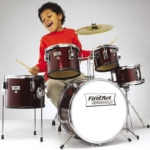Music Education Benefits:
How Music Lessons Help Kids Thrive in School and Beyond
When kids start music lessons, they’re doing more than just learning scales and songs — they’re building skills that will help them thrive in school and in life. Whether they’re strumming a guitar, singing in a group, or tapping out rhythms on the piano, music education provides powerful developmental benefits that go far beyond the lesson room.
In this post, we’ll explore how music education benefits students academically, socially, and emotionally, with research-backed insights and resources to help you support your child’s learning journey.
1. Academic Benefits of Music Education
It’s no coincidence that many high-performing students are also involved in music. Studies show a strong correlation between music education and improved academic performance.
-
Boosts language and reading skills
Learning music helps develop areas of the brain related to language acquisition and reading. A study by the University of Southern California found that children engaged in music instruction had more developed auditory systems, which are critical for reading. -
Enhances math understanding
Music and math are closely linked through rhythm, patterns, and ratios. According to the National Association for Music Education (NAfME), music students often show higher proficiency in math and standardized test scores. -
Improves memory and focus
Playing an instrument or memorizing a song strengthens working memory and concentration — skills essential for success in the classroom.
2. Social and Emotional Growth
In a world where kids face increasing academic and social pressure, music offers a healthy outlet for self-expression and connection.
-
Builds confidence
Mastering a new song or performing in front of others helps kids grow their confidence step by step. These small wins carry over into classroom participation and social settings. -
Encourages teamwork
Group music lessons, ensembles, or choir require students to listen, cooperate, and adjust — all essential life skills. As PBS reports, children who play music together develop empathy and stronger peer relationships. -
Reduces stress
Music has a calming effect. Practicing or listening to music can reduce anxiety and provide a comforting routine, especially during busy school weeks.
3. Lifelong Learning and Resilience
Music education isn’t just about instant results — it’s about building habits of perseverance and creativity that last a lifetime.
-
Teaches discipline and goal-setting
Regular practice builds discipline and shows kids that progress takes time. Setting goals — whether it’s learning a new piece or performing at a recital — teaches commitment and follow-through. -
Fosters creative thinking
Music invites kids to interpret, improvise, and express themselves — crucial skills for innovation in any field. A report by the Arts Education Partnership highlights that arts education, including music, supports creative problem-solving and adaptability. -
Opens doors for future opportunities
Whether a child continues music into high school, college, or adulthood, it becomes a part of their identity — one that’s often valued by scholarship committees, employers, and communities.
Supporting Your Child’s Musical Journey
The music education benefits are clear, and the good news is: it’s never too early (or too late) to start. Whether your child is in preschool or high school, there’s a path for them to explore music in a way that’s joyful, enriching, and full of growth.
If you’re looking for a place where your child can thrive through music, we’d love to help. At OSMD, we offer lessons in voice, piano, guitar, drums, and more — all designed to be fun, confidence-building, and developmentally appropriate.
Ready to get started? Contact us to schedule a trial lesson and experience the benefits of music education for yourself!
Further Reading:
Signing up for lessons is easy!
- Send us more information about your goals
- Register with us now!
- Give us a call at (402) 576-5792



